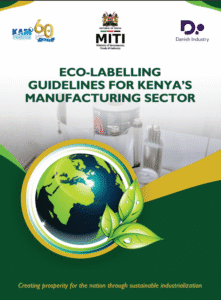Greening the Supply Chain Through Eco-Labelling Guidelines
The Kenya Association of Manufacturers, in partnership with the Confederation of Danish Industry and the Ministry of Investments, Trade and Industry, launched the Eco-Labelling Guidelines for Kenya’s Manufacturing Sector. Ecotourism Kenya, as partners through the Kenya Plastic Pact, was honoured to witness this significant step toward responsible production and consumption on the 7th of August 2025 at Mövenpick Hotel in Nairobi. In representation was the Ecorating Officer for Cities and Urban Areas, Mr. George Ireri. The guidelines, presented by Loise Wangui, Managing Partner & ESG Lead at Protos Capita, provide a structured and detailed framework for implementing eco-labelling across the Kenyan manufacturing sector. They are practical, comprehensive, and designed to drive improvements in environmental sustainability and social responsibility.
The Ecorating Certification received an honourable mention, as being one of the longest serving local sustainability labels in tourism for accommodations in Kenya.
The core goals of the guidelines are;
- To standardise eco-labelling criteria across the manufacturing sector
- To provide a clear and accessible certification process
- To support ongoing monitoring and improvement of sustainability performance
- To promote inclusive development by embedding fair labour practices and community engagement into manufacturing systems.
These guidelines apply to all manufacturing categories. They cover every phase of the product lifecycle, from raw material sourcing, through production and packaging, to distribution and disposal. The focus is on real-world implementation. This includes enabling sector-specific adaptations while maintaining overall alignment with national and international sustainability goals.
Implications for the tourism sector include;
- Enhanced Supply Chain Credibility
As manufacturers align with eco-labelling standards, demonstrating conscientious production in areas like energy use, waste management, and responsible sourcing, Kenya’s tourism sector stands to benefit through a more trustworthy supply chain. Hotels and lodges aiming for sustainability can strengthen their sustainability commitment by sourcing from certified local businesses. - Stronger Appeal to Conscious Travelers
With an increasing number of tourists prioritising sustainability, 76% prefer accommodations with clear sustainability certifications, and eco-labelling across manufacturing amplifies Kenya’s appeal as a sustainability-conscious destination. Tour operators and accommodations that incorporate certified products can more powerfully market their commitment to responsible consumption and environmental stewardship. - Promotion of Local Linkages
Tourism often advocates for local sourcing and community-driven value chains. Eco-labelling can strengthen these linkages by formally assuring that supply (e.g., textiles, souvenirs, food products) meets environmental and social criteria, aligning well with tourism’s emphasis on community benefits and authentic local experiences. The guidelines, well utilised, can enable supply businesses to have credibility when looking to engage responsible tourism businesses. - Market Differentiation
For tourism businesses, the use of eco-labelled local products such as organic teas, ethically produced handicrafts, or sustainably packaged toiletries can serve as a point of differentiation. These procurement choices showcase a commitment to responsible practices and resonate with both domestic and international visitors seeking authenticity and sustainability. - Reduced Waste Production
Eco-labelling standards encourage manufacturers to minimise waste during production and adopt recyclable or biodegradable packaging. For tourism, this means fewer single-use plastics and non-biodegradable products entering the value chain. As hotels, attractions, and tour operators source more eco-labelled goods, destinations benefit from reduced litter and pollution, resulting in cleaner beaches, parks, and urban areas, ultimately enhancing visitor satisfaction and protecting natural ecosystems.
Eco-labels often spark broader behavioural and supply chain shifts. As manufacturers embrace eco-labelling, they adapt packaging, materials, and logistics, creating ripple effects across tourism value chains. This elevates environmental and social performance throughout the sector, reinforcing Kenya’s standing as a regional leader in sustainable tourism. By promoting responsible product management from sourcing to selling, eco-labelling empowers manufacturers to take ownership of their products’ life cycles while enabling tourism businesses to offer more authentic, impactful, and environmentally conscious experiences. We encourage businesses and manufacturers to adopt responsible production models and embrace ecolabelling to holistically manage their products and services.









Leave a Reply
Want to join the discussion?Feel free to contribute!